Bring It On
Shoot any kind of outdoor footage of the Middle East (especially in Iraq, Saudi Arabia, Afghanistan, et. al.) and you get the same flat terrain…aflame, parched, bleachy…which makes for a kind of atmospheric monotony.
But movies shot there (or which happen there) don’t have to be dull. The Middle East is the dramatic boiling pot of our times. It’s just a matter of going there and absorbing the particulars and pruning them down into something fitting and well- sprung.

U.S. soldier involved in fighting in Falujah in ’04
I’ve recently seen a no-pulse, no-conflict, Waiting-for-Godot Middle East film (Sam Mendes’ Jarhead) and a complex, multi-layered, altogether fascinating one about the pernicious social and political political effects of big oil (Stephen Gaghan’s Syriana)…and leapin’ lizards, talk about a night-and-day response.
I’ll be waiting until 11.23 before running a Syriana review, but it’s obviously a far better film.
< ?php include ('/home/hollyw9/public_html/wired'); ?>
Jarhead was so bad and so nothing that it would feel almost refreshing to see a real Middle East war movie — a half-real, half- fictional narrative about the current conflict in Iraq, say. And why not? It’s time.
Hollywood didn’t feel safe about making Vietnam movies until 1978, and the first major Gulf War movie — David O. Russell’s Three Kings — didn’t happen until ’99, or about eight years after the fact. But the concepts of lag-time and the usual “gee, can we get into this?” no longer apply.
The reality of instant digital commnunications means that dramas (or black come- dies) about current military conflicts need to be shot and rescrambled with some urgency. Waiting around won’t do. Immediacy may not be the whole game, but it matters as much as anything else.
Syriana, which Gaghan researched in the Middle East for a full year, is a geo-political spellbinder that doesn’t feel the least bit dated. The story could have happened last summer, or even a year or two from now.
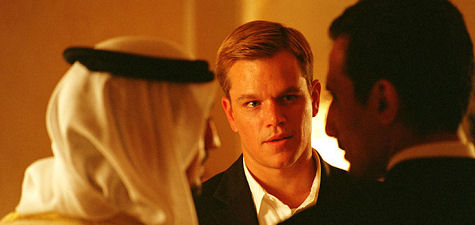
Matt Damon (center) in Stephen Gaghan’s Syriana (Warner Bros, 11.23)
Steven Bochco’s Over There, the first dramatic TV series about an ongoing war, much less one about U.S. troops in Iraq, had its debut on FX last summer. And Hany Abu-Assad’s Paradise Now, a respected film about a couple of would-be Palestinian martyrs, has a ripped-from-right-now quality.
Why not an Iraq War feature right now? Write it, shoot it…sort it out as you go along.
A writer-director of some vision and gumption needs to visit Iraq, get imbedded with the grunts like Gunner Palace‘s Michael Tucker did, soak it up, write it down, find the funding and make a feature film about what’s eally happening in that hell-hole.
Shoot the atmospheric stuff right there, maybe bring some of the cast over…risk it, dodge the bullets, burrow in. And then wrap it, cut it and open it quickly.
If Oliver Stone was the Oliver Stone of the mid to late ’80s, he’d be the guy to do this.
If Italian actor-filmmaker Roberto Benigni (who won a Best Actor and Best Foreign Film Oscar for Life Is Beautiful) can make an Iraqi War film, why can’t Americans?
Benigni just opened a comedy set against the backdrop of the Iraq conflict, althou- gh it was shot in Tunisia. An admired film (if not quite the anti-American rant some of his Italian fans had expected), The Tiger and the Snow opened on 10.14 in Italy and will debut in France in mid-December and probably open here during the first six months of ’06.
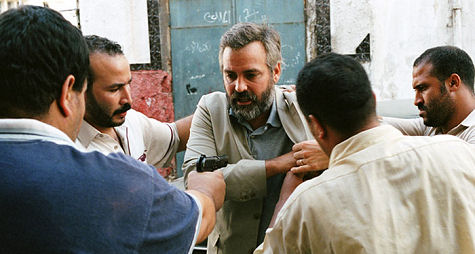
Syriana uncertainty: George Clooney’s CIA agent between a rock and hard place
A U.S.-produced drama about the current conflict obviously wouldn’t have to be shot in the streets of Baghdad or Fallujah.
A satisfying film for me would probably have to be something like Syriana or Traffic — a multi-character, five or six-plot-thread piece. I’m not going to try and dream up a story here and now, but it would either need to be a Costa Gavras-type condem- nation piece, or one that shows balanced compassion for U.S. troops as well as Iraqi locals.
Has anyone out there written a script or heard of a good one making the rounds? Is there a military veteran, freelance journalist and/or contract engineer who’s been to Iraq within the last couple of years who’s published stories or recollections on a site that could be made into a good script?
If there’s anything really good that’s been put into script form, or if anyone’s heard of something exceptional making the rounds, please advise.
Aniston Martin
Derailed has been handed a Rotten Tomatoes death sentence — only 19% of the critics approve. But it’s only somewhat bad because of certain hard-to-swallow developments that I won’t divulge. And it’s been well directed by Mikael Halfstrom, and by that I mean it feels solid, assured, nicely shot and well-cut.
Thrillers of this sort often get trashed by critics but supported by paying audiences. An agent told me this morning that Derailed, which opened today, has been doing well in New York theatres.
Like Fatal Attraction and Unfaithful, Derailed is a cautionary thriller about what happens when you cheat on your spouse.
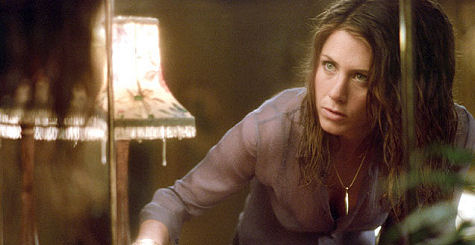
Jennifer Aniston in Mikael Halfstrom’s Derailed
Clive Owen plays a Chicago advertising guy who succumbs to temptation after meeting Jennifer Aniston, a blue-chip financial consultant, on a commuter train. But then they get robbed and assaulted by Vincent Cassel in a seedy hotel room before they get down to it…
I’m not going any further, but Cassel basically becomes Bruno Antony to Owen’s Guy Haines (the two leads in Hitchcock’s Strangers on a Train), and I’d be lying if I said I wasn’t caught up in all the lever-pulling. It’s far from first-rate, but it’s reasonably decent.
The biggest problem is one that nobody seems to have written about so far, which is the casting of Jennifer Aniston as an adulterer who… well, as a woman who can’t be trusted.
As far as I’m concerned, the believabilty of Aniston as a conniving adultress is about the same as a hypothetical casting of Dean Martin as one of Christ’s disciples in George Stevens’ The Greatest Story Ever Told.
Aniston was a TV actress who deserved a fair shake when she played a cheating housewife in The Good Girl, but she’s since become a tabloid superstar — she’s known worldwide as the nice, emotionally temperate actresss who had her heart broken by Brad Pitt.
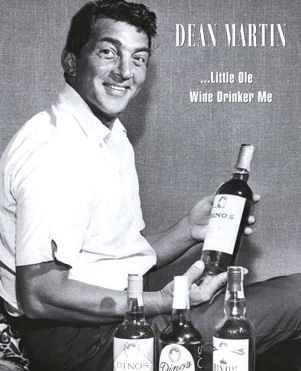
Dean Martin
Whatever the real truth and whomever she may actually be, Aniston is the good wife who got fucked over. It’s hard, but the public persona of some actors and actresses is so deeply imbedded that they can’t be absorbed into in certain roles..period.
Frank Sinatra as a priest in The Miracle of the Bells…get outta town.
Or John Wayne as Genghis Khan or, much worse, as a Roman Centurion standing at the foot of the cross while Jesus is dying in The Greatest Story Ever Told and saying, “This was truly the son of God.”
There must be dozens of other head-slappers. Send ’em in, please.
Ten Years and Two Weeks
I’m a Terrence Malick fanatic from way back, and it’s the nostalgia factor more than anything else that has me especially excited about seeing The New World (New Line, 12.25), which Malick wrote and directed.
I’m also one of the only journalists to have any kind of conversation with Malick since he went into his Thomas Pynchon withdrawal about 17 years ago (right after the release of Days of Heaven) and became this gentle phantom-like figure whom journalists couldn’t get to under any circumstance.
In this context speaking to Malick on the phone– which I managed to do on Octo- ber 25, 1995, around 11:35 am — was like snapping a photo of Bigfoot. It was a half-pleasant, half-awkward, quite meaningless conversation, but at least he picked up the phone.
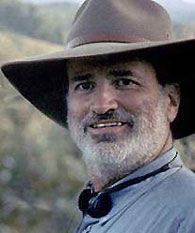
Terrence Malick during filming of The Thin Red Line
Malick had been staying with producer Mike Medavoy, who wound up producing The Thin Red Line, but Medavoy was leaving for Shanghai and Malick would be staying elsewhere, so I called to get a forwarding number.
A cleaning woman answered and said Medavoy was out, but that Malick was nearby. She asked me to hold…
Malick: Hi.
Me: Hi, Terry. This is Jeffrey Wells speaking…
Malick: Hi.
Me: And uhh…I was just talking to Mike last night and he said, uh, you might be leaving today and I wanted to see if I could speak with you about an article I’m researching. It’s for Los Angeles magazine and my editor…he worked on that piece about ten years ago with David Handleman for California magazine. It was called “Absence of Malick.”
Malick: Yeah.
Me: I don’t know if…did you happen to read it?
Malick: No, I…I…uhnn…
Me: Anyway, I’m doing this piece and trying to sort things through here. About what’s going on with…well, to start with, The Thin Red Line and that rumored BAM stage production of “Sansho the Bailiff” and…I’ve wanted to speak with you about it, and now that I’m speaking with you I feel…well, I feel nervous.
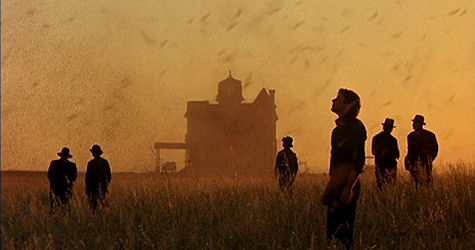
Locust arrival scene in Terrence Malick’s Days of Heaven
Malick: Don’t be, Jeffrey. It’s not that. I just don’t feel comfortable talking about it yet.
Me: About Red Line, you mean?
Malick: Yeah and…it’s something that has no date, really. It may happen some- time in the indefinite future.
Me: The indefinite future? Uh-huh. So there’s no approximate, long-range plan at all? It’s not even on a low flame?
Malick: I…I’m…uhmm.
Me: I was only thinking, you know…heh-heh… ‘indefinite future.’ You could say the same thing about the sun collapsing and the end of the solar system, heh-heh.
Malick: Uhhmm…
Me: I’m only mentioning this because…well, you may have seen that item in Pre- miere that you said you had this reading of the script with Costner and Lucas Haas and Ethan Hawke.
Malick: We did it just to get a sense of how it flowed.
Me: How did it flow?
Malick: I just don’t feel comfortable talking about it. I appreciate your interest but…
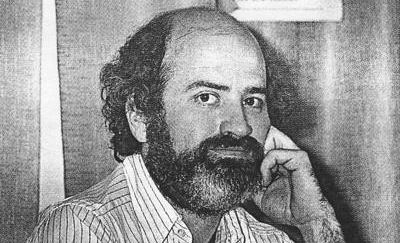
Malick in 1979
Malick: Mike says you’re on the second or third draft, something…it’s a work that’s been through some development and progression, and…
Malick: I….
Malick: I dont want to grill you, Terry. Mike explained the rules and said that grilling you…’that’s the one thing we don’t do’…and I understand that. I had a hope, though, of just discussing movies in general…ones you’ve seen and been impressed by in recent years.
Malick: Well, I appreciate your interest. I guess I do feel uncomfortable talking right now.
Me: I’m just one of…who knows, hundreds of film journalists around the country who regard you as one of the best ever and have watched your films over and over.
Malick: You’re very kind, Jeffrey. I appreciate it and I feel it and it comes to me as very encouraging. But I feel uncomfortable talking about it. I spoke to my brother Chris and he said that you’re just trying to help. And of course I know you’re just trying to do your job.
Me: I was actually just reading about a new laser disc of Days of Heaven that’s coming out, and it’s really something I’m looking forward to because I’ve never seen a print of that film that equalled the first viewing at the Cinema 1 in New York when they showed a 70mm print with six-channel sound, and having a…are you a laser-disc aficionado?
Malick: I’m, uh…not..uh…
Me: Are you…you don’t watch TV? Videos? Do you ever catch movies on tape?
Malick: I’d be happy to talk to you at some later point, Jeffrey.
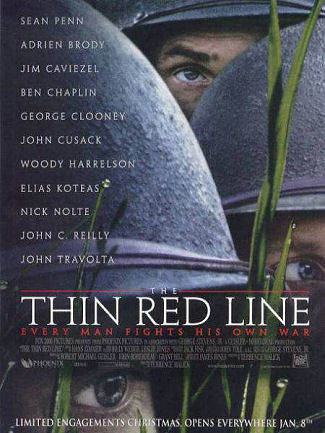
Me: I know. I understand know what the rules are.
Malick: And someone actually is here, Jeffrey, and I do have to keep an appointment. I would love to, later on…we could talk.
Me: I’ll look forward to it. I understand you’re in town for a few more days.
Malick: Yes, but I really do have to go now.
Me: Because if you have a moment later on, I’d like to run some basic points by you and just go over them one by one, for accuracy’s sake.
Me: I can’t really talk about this. I know what you’re trying to do and it’s not…if you’d try to understand. Chris told me you’d written and that you were trying to help.
Me: Well, I hope you have a good stay. I look forward to chatting again on a more…uhm, relaxed basis.
Malick: Okay, thank you.
Rent Renewal
The advance word on Rent (Columbia, 11.23) for the last few months has been that it’s going to feel slightly dated (being a late ’80s piece about some young AIDS-af- flicted Manhattanites), and Chris Columbus, not the grittiest and most naturalistic of directors, will gloss it up too much, so watch out.
The buzz was wrong. Say it again: the buzz was wrong.
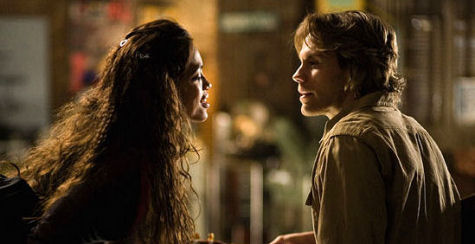
Rosario Dawson, Adam Pascal during “Light My Candle” number in Chris Columbus’s film of Jonathan Larson’s Rent (Columbia, 11.23)
Call me emotionally impressionable, call me unsophisticated, call me a sap…but I saw Rent last night in Santa Monica, and in its vibrant, open-hearted, selling-the- hell-out-of-each-and-every-song-and-dance-number way, it’s a knockout and an ass-whooper and damn near glorious at times.
I didn’t just like it…I felt dazzled, amped, alpha-vibed. I got into each and every song, every character and conflict…I settled back and went with it. People were applauding after almost every song, and the film really does give you a “whoa… this is special” feeling.
Somewhere up there (out there, in there…whatever), Jonathan Larson, the guy who created the play but died in January 1996, just before the stage show opened, is breathing easy.
Columbus went with almost the entire original cast, and they’re all spot-on. A cer- tain theatricality is inevitable when actors are breaking into song, but everyone plays it down and naturalistic; they don’t project in a playing-to-the-balcony way that throws you out of the piece.
Adam Pascal’s Roger and Anthony Rapp’s Mark are note-perfect. Rosario Daw- son’s singing is surprisingly assured and satisfying, in addition to her usual first- rate emoting. Wilson Jermaine Heredia, Jesse L. Martin, Idina Menzel, Tracie Thoms, Taye Diggs…everyone gets a gold star.
Rent is a slicker, punchier, more revved-up movie musical than Milos Forman’s Hair, which had some of the same elements (kids in New York, in and out of love, looming tragedy). But it’s not that different from the Forman film; it has a similar elan.

I kept saying to myself last night, “What’s wrong with this film?….where’s the mis- calculation? Where’s the gross Chris Columbus saccharine overkill?”…and it just didn’t happen to any bothersome degree.
It may not be hip enough for some of my nyah-nyah, know-it-all critic friends. It may not be Alphabet City enough. It may be, for them, too far removed from the vitality of the original off-Broadway, pre-Broadway show…too much of a Holly- wood-style take on something that may have been a bit sweet or cloying, but which worked because of the Lower East Side funkitude balance-out factor.
Critics said the same thing about Robert Wise’s West Side Story. That overly Oscar-awarded film brought an overly sanitized, sound-stagey quality to the material, wich furthered the loss of the immediacy and excitement of the original B’way play. The dissers of Wise’s film were right. It was too 1961 mainstream.
But Columbus is not Robert Wise. He lived in Manhattan way back when and knew the Lower East Side, he knows the stage show backwards and forwards, he’s pruned it down a bit and has made a film that’s a lot tighter and brighter and a cleaner “sell.”
I saw Rent in ’96 with Jett, who was then about eight, and I remember enjoying the energy and a lot of the songs and feeling a general respect for it…but I wasn’t floored. For me, the film is a better ride.
I don’t want to compare apples and oranges, and I understand that Rent-heads might not agree that it’s “better,” but the film is a cleaner, more easily processed thing, and it delivers a fuller, riper feeling.
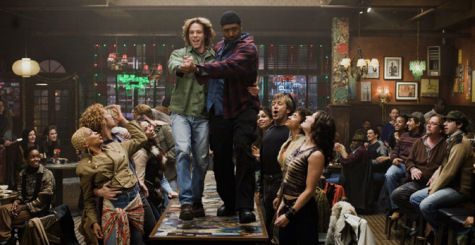
The “La Boheme” number
There’s really a lot to be said for being able to hear each and every song lyric. (I digested them only occasionally when I saw the stage version.) And being able to hear each and every voice in the chorus of “Seasons of Love” (and every song after that) provides an amazing high.
Has Columbus made a kicky and colorful c’mon-kids-let’s-put-on-a-show musical? Yeah, kind of…but what’s wrong with that? And what other way could Columbus have gone? Play down the energy, go grimmer, shoot in on Super 16mm, channel Darren Aronofsky or Larry Clark?
Rent is a big-studio movie musical. As I understand it, the idea is to turn people on, attract the fans of the stage show, sell tickets, etc.
It’s not Open City or Paisan or Rocco and his Brothers. It’s a revamp of Puccini’s “La Boheme” with all those primary emotions, catchy thrash-guitar songs, drama- tic condensings, lovers loving and losing each other, tomorrow belongs to no one so go for it today, etc.
And it’s Rent, after all…butter wouldn’t melt in its mouth.
I’m sorry to differ with the nyah-nyahs, but Columbus has taken these ingredients and made it all sound quadruple-fantastic (be absolutely certain you see Rent in a theatre with a great sound system) and punched it up and brought out the bells and whistles and made a movie musical that really delivers.
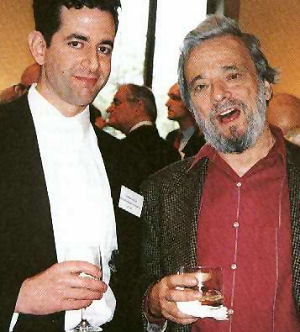
Rent creator Jonathan Larson, composer-lyricist Stephen Sondheim sometime around ’94 or ’95.
You’ll be more likely to feel this way if you’re a not-very-hip type like myself, or if you’re in the same kind of head-space as those 425 satisfied folks who saw it with me at the Aero theatre. And if you’re in the opposite camp…it’s your call.
Rent is set in 1989 — the stage show was written between 1988 and ’90. The show is basically about the effect that being close to death has upon your basic life atti- tudes. We all know the riff about “the clarity of mind experienced by a man stand- ing on the gallows is wonderful,” etc. That’s all that’s being said here, and that’s obviously a theme that will never lose relevance.
The young-gay-guys-and-urban-drug-users-dropping-like-flies-from-AIDS element isn’t the same today as it was in the early days of the first Bush administration , obviously (and thank fortune)…but this doesn’t date the film — it just places it in a certain cultural context, and that’s nothing to get over.
I know it when something is working. Call it subjective, but I felt it last night and it wasn’t just me.
A guy who loved the off-Broadway stage version said he’s heard it doesn’t work because the actors seem too old. “They’re all supposed to be in their early 20s …the actors all look like they’re 28 or 30,” he told me this morning. That’s bull- shit…they’re young-enough looking. It’s a non-issue.
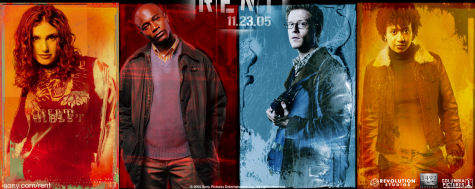
There are three love relationships in Rent, and only one of them (Adam and Rosa- rio’s) is hetero. We’re really in a gay-friendly season these days, and there’s no watching Rent and missing the notion that we’re all God’s children. The Mel Gibson contingent can go stuff it.
The energy and punch of this show are there all the way through, and the emotion- al specifics of each and every character and situation are clearer and more vivid than they appeared to me when I saw the stage show…whoops, repeating myself.
There will be more to say about Rent in a week or two. Those crab-heads really need to be slapped around.
Columbus did a post-screening q & a with Variety‘s Ian Mohr, and here’s how it sounded. It’s a big fat (probably slow-loading) sound file, but it’s worth a listen.
You’ll hear me ask a couple of questions — one about an angry duet number between Pascal and Rapp that was cut, and another about the “dated” issue, which Columbus answers pretty well.
Debate
“I saw Rent yesterday, and I thought it absolutely blew chunks. I haven’t seen the stage play and knew nothing from the music. Went in with a totally open mind, but…
“The score is awful. Mediocre rock songs with banal lyrics — every single one of them seemingly introduced by the same string of piano chords. And they all sound alike except for the first number, which is the only memorable piece in the entire production. Just dreadful.
“Some of the production numbers — particularly ‘La Vie Boheme’ — are too loud, too crowded, too all-over-the-place. It also seems to me that Larson was incapable of writing a song that didn’t involve a multi-part chorus. Again, just dreadful.
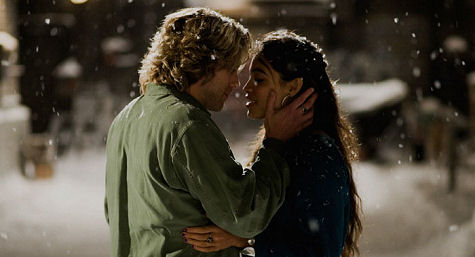
Adam Pascal, Rosario Dawson in Chris Columbus’s film of Jonathan Larson’s Rent (Columbia, 11.23)
“And what’s with that performance piece that Idina Menzel performs? The one involving cows and metaphors about developers, and…sheesh! My brain hurts just thinking about it.
“I will say I didn’t have a problem with the age of the actors, although let’s admit that one or two look way too old for the roles.
“The book sucks also. Cardboard characters, one-dimensional situations, cliches all over the place. But I’ll be honest: you can say the same about a lot of musical theater.
“Thing is, I can understand why twentysomethings will probably dig this. But watching it, I felt how they must feel watching Hair . What the…?” — Lewis Beale
Wells to Beale: Whatever, but answer me this….
The movie is a shorter version of the play with some trims, and it allows you to hear each and every lyric, and it lets you sink into the characters a bit more.
The play has been running at the Nederlander since ’96. That means that it’s been striking chords with audiences on a fairly profound level.

So if the score is so awful and the production numbers are so shitty (and I really don’t know how you could feel this way), how do you explain the play’s popularity? It must be doing something right.
And if the movie is the play only clearer and more condensed (which it is), how can it be totally chunk-blowing, as you say it is?
Beale back to Wells: As I said, I can understand why twentysomethings respond to it. The whole camaraderie thing, the trying-to-find-your-place-in-the-universe thing, rebelliousness, love, etc.
“And let’s not get into the whole art vs. commerce thing. Plenty of plays, movies and CDs are aesthetic crap, but speak to audiences for whatever reason. ‘Phantom of the Opera’ is still on Broadway. ‘Mama Mia’ is a huge hit. Does anyone think these productions are grand artistic statements?”
Empty Vessel
“I’m no Keira Knightley fan but let’s be honest. The only thing that Rachel McAdams has over her is that she has made a film with not only Owen Wilson but Luke wilson too (!) and Keira hasn’t. That connection alone seems to be enough for you to give someone a free pass, or in McAdams’ case a promotion to ‘greatest thing since…’
“Maybe Holden sees something in Knightley that you don’t. It’s a little tiresome hearing you go on and on about someone or something as if it’s the greatest thing in cinema and then as soon as another passionate opinion is expressed that you don’t agree with you resort to describing it as ‘jizzing.'” — Tom Van

Keira Knightley
Wells to Van: Cream over? Wet himself? Experience critical arousal? McAdams’ Luke-and-Owen connection is impressive, yes, but take away Knightley’s looks and transitional aura and she’s treading water, at best. It would be polite for me to say otherwise, but it’s not valid for Stephen Holden to “see something in Knightley that I don’t” because there’s nothing there….end of discussion.
“I agree with your assessment of Keira Knightley. I think there is appeal there and after seeing her on The Daily Show this week, I think I understand what it is.
“She’s a great first date. You see her in little bites — in the trailer for Pirates, for instance — and she’s exciting and great. She made a great best friend in Bend It Like Beckham . Seeing her in a single movie can be okay, but she doesn’t hold interest through to the next morning. I mean, what would you talk about over breakfast?” — Reed Barker, Senoia, Georgia.
9/11 Songs
“The only 9/11-related song I can think of is Richard Thompson’s ‘Outside of the Inside,’ which is actually a commentary on the fundamentalist attitudes that lead people to extremist actions.
“I don’t know if you’re familiar with Thompson’s work, the song is on ‘The Old Kit Bag,’ his excellent record from 2003. He also scored Herzog’s Grizzly Man. His web site is http://www.richardthompson-music.com/default.asp.” — Scott Bishop
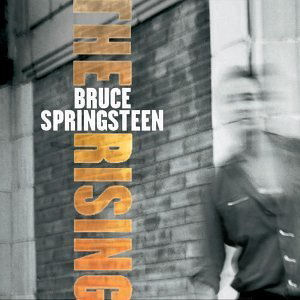
“There’s an Amy Rigby song called ‘Don’t Ever Change’ where the first verse (in my mind, at least) is about being in a small town right after 9/11. You can listen to it here: http://www.amyrigby.com/wheelslyrics.html” — Kristie Coulter
“If you missed ‘Where Were You (When The World Stopped Turning)’ by Alan Jackson, which is utterly unlike Springsteen’s business-as-usual lugubriousness, then you really have to stay in more and watch CMT.” — Richard Szathmary












